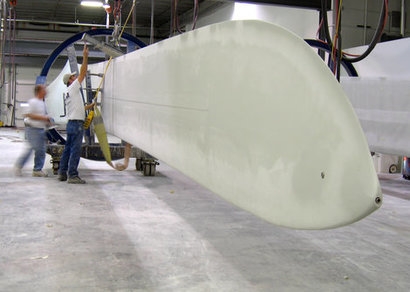
The new technology delivers the final technological step on the journey towards a fully recyclable wind turbine value chain. To enable the adoption of this new technology, and to advance a circular economy across the wind industry, a new initiative entitled CETEC (Circular Economy for Thermosets Epoxy Composites) has been established. Within three years, CETEC is aiming to present a fully scoped solution ready for industrial adoption, based on commercialisation of the novel circularity technology.
Partly funded by Innovation Fund Denmark (IFD), CETEC is spearheaded by Vestas, the global leader in sustainable energy solutions, and involves both industrial and academic leaders including Olin, the world leading producer of Epoxy, the Danish Technological Institute (DTI), and Aarhus University.
Developed by DreamWind, an innovation initiative driven by the same partners, the new technology consists of a two-step process. Firstly, thermoset composites are disassembled into fibre and epoxy. Secondly, through a novel chemcycling process, the epoxy is further broken up into base components similar to virgin materials. These materials can then be reintroduced into the manufacturing of new turbine blades, constituting a new circularity pathway for epoxy resin.
Wind turbines are 85-90 percent recyclable, with turbine blade material constituting the remaining percentage that cannot be recycled, due to the nature of thermoset composites. CETEC is aiming to close this recycling gap and enable a significant step forward in the elimination of waste across the wind energy industry.
“As global commitments to a net-zero future increase, it’s absolutely crucial to ensure the wind industry can scale sustainably, which includes Vestas fulfilling our ambition to produce zero-waste turbines by 2040” said Allan Korsgaard Poulsen, Head of Sustainability and Advanced Materials, Vestas Innovation and Concepts. “Leveraging this new technological breakthrough in chemcycling epoxy resin, the CETEC project will be a significant milestone in Vestas’ journey towards achieving this goal, and in enabling a future where landfill is no longer required in blade decommissioning”.
Simon Frølich, Team Manager, PhD, Danish Technological Institute, added that the key characteristic of composite materials is their unique combination of low weight and high strength, governed by the strong bonding of two different materials – fibre and epoxy.
“The dilemma is that this strong bond is also the feature that renders these materials difficult to recycle” Mr Frølich said. “Therefore, the development of CETEC’s novel technology, enabling disassembly of the composite at end-of-life, is a gamechanger, that will allow us to capture the value represented by each material stream in a new circular value chain”.
Prof. Dr. Troels Skrydstrup, Aarhus University, added that chemcycling of epoxy-based materials would allow deconstructing these highly stable polymer chains into molecular building blocks and that these building blocks are easily processable and can be utilised to produce new epoxy, which will have the same quality as the original material.
CETEC’s solution will address the lack of available recycling technology for epoxy resins. This would in turn create the possibility to introduce new recycling solutions to the wind industry. This holds significant potential for commercial value capture, particularly in markets where regulation around waste management for manufacturing industries is tightening to serve a broader sustainability agenda. When fully developed, the solution may also have an impact for other industries that rely on thermoset composite in production, such as automotive and aviation.
For additional information:

